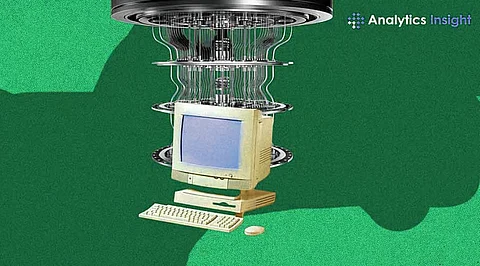Business
Quantum Computers: Navigating Trust and Reliability in Innovation

Quantum computers are revolutionizing problem-solving capabilities across various sectors, but challenges surrounding their reliability persist. These advanced machines harness the power of qubits, enabling them to tackle complex calculations that would take classical computers thousands of years. Despite this potential, the issues of errors and noise remain significant obstacles in achieving full trust in their outputs.
Understanding Quantum Computing’s Promise and Challenges
The core strength of quantum computers lies in their ability to perform multiple calculations simultaneously, thanks to the unique properties of qubits. Unlike classical bits, which represent either a 0 or a 1, qubits can exist in superpositions of states, dramatically increasing computational power. Yet, this immense capability is tempered by the fragility of qubits. Small disturbances, such as temperature fluctuations or electromagnetic interference, can lead to decoherence, where qubits lose their quantum characteristics. This vulnerability, coupled with the potential errors introduced during quantum gate operations, raises concerns about the reliability of the results produced by current quantum systems, often referred to as noisy intermediate-scale quantum (NISQ) devices.
Researchers are actively addressing these reliability issues through various techniques. Quantum error correction is a promising approach that distributes information from one logical qubit across multiple physical qubits. This method allows for the detection and correction of errors before they affect the final outcome. Nonetheless, implementing effective error correction remains resource-intensive, posing a challenge as the field continues to advance.
Verification Methods and Progress in Reliability
Verification of quantum computing results presents a significant challenge that complicates trust in their outputs. Many solutions generated by quantum computers cannot be verified by classical computers, leading to what is known as the “black box” problem. To tackle this, scientists employ several verification techniques. Some protocols incorporate “trap” calculations within complex tasks, allowing researchers to assess the reliability of the results. If the quantum computer fails to pass the trap test, confidence in the output diminishes.
A notable advancement in verification comes from researchers at Swinburne University, who developed a classical method to validate Gaussian Boson Sampling experiments. This innovative approach can check results in mere minutes—tasks that would otherwise take classical machines thousands of years. Furthermore, hybrid quantum-classical systems enhance accuracy by comparing intermediate steps, ensuring the results remain trustworthy.
The concept of quantum advantage serves as a benchmark for trust in quantum computing. This term refers to the ability of a quantum computer to solve real-world problems more efficiently than classical counterparts. In contrast, quantum supremacy merely demonstrates a quantum computer’s capability to address problems unattainable by classical means. Achieving widespread trust will hinge on quantum systems consistently delivering verified and practical solutions.
Major players in the quantum computing landscape, such as IBM and Google, continue to make strides in improving both hardware and software. Noteworthy advancements include enhancements in qubit coherence and reductions in gate errors. For instance, Google’s Willow chip has demonstrated remarkably low error rates while managing over 100 qubits. As development progresses, the reliability of quantum computing applications in fields such as optimization, cryptography, and material simulations is expected to grow significantly.
Despite these advancements, it is crucial to recognize the limitations of quantum computing. Current systems remain far from ideal, as qubits are still susceptible to noise and the output is often probabilistic. Moreover, classical verification methods cannot fully ascertain the correctness of complex problem solutions. Fully fault-tolerant quantum computers capable of autonomously correcting all errors are still years away, making careful verification and cautious interpretation essential.
As the field of quantum computing evolves, the potential for its transformative impact on various domains is immense. With improved verification methods and continued hardware upgrades, trust in quantum answers is gradually increasing. As technology progresses, confidence in quantum computing will likely expand, leading to new applications and innovations across science, industry, and research.
-

 Science4 weeks ago
Science4 weeks agoALMA Discovers Companion Orbiting Giant Red Star π 1 Gruis
-

 Top Stories2 months ago
Top Stories2 months agoNew ‘Star Trek: Voyager’ Game Demo Released, Players Test Limits
-

 Politics2 months ago
Politics2 months agoSEVENTEEN’s Mingyu Faces Backlash Over Alcohol Incident at Concert
-

 World2 months ago
World2 months agoGlobal Air Forces Ranked by Annual Defense Budgets in 2025
-

 World2 months ago
World2 months agoMass Production of F-35 Fighter Jet Drives Down Costs
-

 World2 months ago
World2 months agoElectrification Challenges Demand Advanced Multiphysics Modeling
-

 Business2 months ago
Business2 months agoGold Investment Surge: Top Mutual Funds and ETF Alternatives
-

 Science2 months ago
Science2 months agoTime Crystals Revolutionize Quantum Computing Potential
-

 Top Stories2 months ago
Top Stories2 months agoDirecTV to Launch AI-Driven Ads with User Likenesses in 2026
-

 Entertainment2 months ago
Entertainment2 months agoFreeport Art Gallery Transforms Waste into Creative Masterpieces
-

 Business2 months ago
Business2 months agoUS Government Denies Coal Lease Bid, Impacting Industry Revival Efforts
-

 Health2 months ago
Health2 months agoGavin Newsom Critiques Trump’s Health and National Guard Plans









